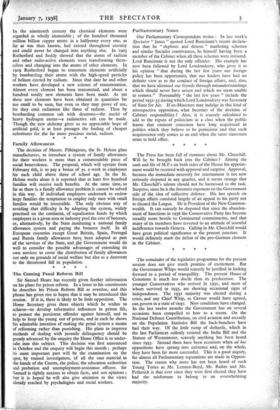The remainder of the legislative programme for the present session
does not give much promise of excitement. But the Government Whips would scarcely be justified in looking forward to a period of tranquillity. The present House of Commons is much less docile than its predecessor. The younger Conservatives who arrived in 1931, and most of whom survived in 1935, are showing occasional signs of independence. The 1931 majority was elected during a crisis, and any Chief Whip, as Cavour would have agreed, can govern in a state of siege. Now conditions have changed. In the last twelve months the Government has on several occasions been compelled to bow to a storm. On the National Defence Contribution, on civil aviation and recently on the Population Statistics Bill the back-benchers have had their way. Of the little rump of diehards, which in the last Parliament sullenly resisted the India Bill and the Statute of Westminster, scarcely anything has been heard since 1935. Instead there have been occasions when ad hoc oppositions have sprung into existence and, on the whole, they have been far more successful. This is a good augury, for almost all Parliamentary reputations are made in Opposi- tion. The reason why more has not been heard of such Young Tories as Mr. Lennox-Boyd, Mr. Raikes and Mr. Petherick is that ever since they were first elected they have had the misfortune to belong to an overwhelming majority.









































 Previous page
Previous page